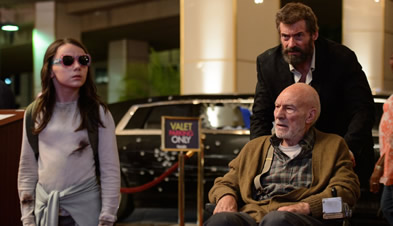Could the bloody, profane, R-rated movie Logan somehow deliver a more redemptive message than The Shack? Relevant contributor Seth Hurd argues that perhaps it does. “From the opening scene, it’s clear that [Logan] is a story about death. Because the badness is so real, the moments of redemption are so clear. If the darkness isn’t so bad, there’s no real need for saving,” he writes. A bit later on, he adds, “The biggest difference between The Shack and Logan is that the former wants to tell you what to do, and feels a compulsive need to explain itself. In book format, that can be categorized as self-help. But on the screen, it’s propaganda. And propaganda can’t stir like art can.”
Hurd also quotes a 2015 issue of Parade magazine in which actor Hugh Jackman talked about his own faith: “I’m a Christian. I was brought up very religious. … I’m a religious person. This is going to sound weird to you. In Chariots of Fire the runner Eric Liddell says, ‘When I run, I feel His pleasure.’ And I feel that pleasure when I act and it’s going well, particularly onstage.”
Meanwhile, imagine being a celebrity, being recognized everywhere, constantly having people ask to take a picture with you. Might it get a bit … tiresome? Probably. So it’s no surprise, really, that some celebs are saying no. But the reasons at least one famous actress is saying no might surprise you.
Emma Watson, best known for her role as Hermione in the Harry Potter films, recently told Time, “For me, it’s the difference between being able to have a life and not. If someone takes a photograph of me and posts it, within two seconds they’ve created a marker of exactly where I am within 10 meters. They can see what I’m wearing and who I’m with. I just can’t give that tracking data. I’ll say, ‘I will sit here and answer every single Harry Potter fandom question you have but I just can’t do a picture.’ I have to carefully pick and choose my moment to interact. When am I a celebrity sighting versus when am I going to make someone’s freakin’ week? Children I don’t say no to, for example.”
Speaking of which, one unexpected interaction (including lots of selfies) between regular Joes and famous types recently came during the Oscar telecast. Host Jimmy Kimmel diverted a busload of tourists who thought they were going to a wax museum right into the front row of the show, where many A-listers were seated.
While the stunt drew raves from some quarters, others are still asking questions about the potential unintended consequences. “Some thought it was a charming display of Hollywood’s star power, but for others it was unclear who was the butt of the joke,” writes L.A. Times reporter Libby Hill. “The success of Kimmel’s stunt depends on whom you consider the rube in this situation. Was it Jennifer Aniston, who was shamed into giving a stranger her sunglasses? Was it ‘Gary From Chicago’ whose charming antics garnered him instant Internet fame followed by immediate public scrutiny? Or was it Kimmel for trying to pierce Hollywood’s bubble with a dose of common folk? When an ordinary person becomes the punchline to Hollywood’s joke, there are consequences that Kimmel and his ilk aren’t equipped to handle.”
Still, we’re reminded by these stories that smartphone distractions can show up in the most unlikely places. And several new studies recently have once again identified concerns with this technology that Culture Clips has noted before. These include the dangers of radiation, dry eyes and digital eyestrain, and, feeling lonely if you spend too much mobile time surfing social media.
Maybe those are some of the reasons why the Pope has once again encouraged folks to spend less time looking at our little screens and more time reading God’s Word. He challenged a crowd gathered at St. Peter’s square to ponder what might happen “if we read the message of God contained in the Bible the way we read messages on our cellphones.”
Christianity Today contributor Christina Crook proffered a similar exhortation in her article “Lent, Unplugged.” She writes, “For many, the smartphone has become the ultimate vice. We are living in a never-off culture, where the speed and gloss of our screens often makes the connection to those far away seem more interesting and urgent than the people and experiences right in front of us. It’s happening to teens at prom, parents on soccer fields, and CEOs in boardrooms. Our energy, creativity, and time—perhaps the best of us—are being spent committed to screens.”
Crook also quotes Tanya Schevitz, spokesperson for The National Day of Unplugging, who adds, “The expectation that you are always reachable, that you will respond immediately to those beeps, buzzes and rings coming from your phone—it’s created a society of people who are on edge, overwhelmed and disconnected from those around them. It’s important that people take control of their technology so that it doesn’t control them.”






Recent Comments